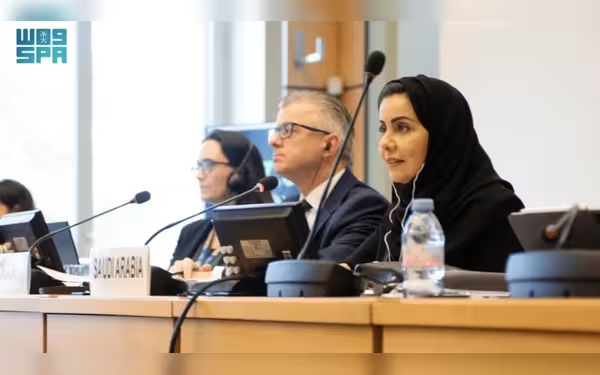Monday, December 23, 2024 04:43 AM
Saudi Arabia's Commitment to Justice and Equality Under Vision 2030
- Saudi reforms enhance justice and equality for all residents.
- Women's labor market participation surged to 35.4% by Q3 2024.
- Diversity in Saudi Arabia includes over 13 million residents from 60 nationalities.
 Image Credits: arabnewspk
Image Credits: arabnewspkSaudi Arabia's reforms under Vision 2030 promote justice, equality, and women's empowerment, showcasing a diverse and inclusive society.
In recent years, Saudi Arabia has embarked on a journey of significant reforms aimed at enhancing justice and equality within its borders. The Kingdom's commitment to these principles has been underscored by the president of the Human Rights Commission, Hala bint Mazyad Al-Tuwaijri, who recently highlighted the positive changes taking place in the country. These reforms are part of the broader Vision 2030 initiative, which seeks to modernize the Kingdom and promote a more inclusive society.
Al-Tuwaijri noted that since the launch of Vision 2030, Saudi Arabia has become a melting pot of cultures, with over 13 million residents from more than 60 nationalities now calling the Kingdom home. This diversity represents over 40 percent of the population, showcasing the Kingdom's openness to different races, cultures, and religions. Importantly, these residents are afforded equal rights and protection against racial discrimination, a significant step towards fostering a more equitable society.
The Human Rights Commission has been proactive in issuing and amending regulations that promote protection from discrimination. One of the key initiatives highlighted by Al-Tuwaijri is the national policy aimed at ensuring equal opportunities and treatment in employment. This policy is crucial in addressing labor market discrimination, which has historically been a challenge in many societies.
Furthermore, the Kingdom has taken strides to prevent child labor and has established labor courts to enhance labor justice. These measures reflect a commitment to uphold the rights of workers and ensure fair treatment in the workplace. Al-Tuwaijri emphasized that the late King Abdulaziz bin Abdulrahman laid the foundation of the Kingdom on principles of justice, equality, and the rejection of racism and discrimination. Today, under the current leadership, these principles are being interpreted in a contemporary context, leading to a robust legislative and judicial framework to combat racism and racial discrimination.
In addition to these efforts, the Saudi delegation to the Committee on the Elimination of Racial Discrimination (CERD) session reported significant advancements in gender equality. Many regulations, including the Travel Documents Law, Civil Status Law, Labor Law, and Social Insurance Law, have been amended to promote equality between men and women. As a result, women's participation in the labor market has surged to 35.4 percent by the third quarter of 2024, marking a remarkable increase of 108 percent since 2017. This achievement not only surpasses the targets set by Vision 2030 but also reflects a changing societal landscape.
Moreover, the representation of women in leadership roles has seen a positive shift. The number of women serving as chairpersons or vice-chairpersons of boards has reached 327, while the total number of women board members stands at 1005. In the private sector, women now hold 43.8 percent of mid and senior management positions. Additionally, the Kingdom has appointed six female ambassadors abroad, with 204 female diplomats and 246 women working in international institutions globally.
Saudi Arabia's ongoing reforms signify a pivotal moment in the Kingdom's history, as it strives to uphold the principles of justice and equality for all its residents. The commitment to inclusivity and the empowerment of women not only enhances the social fabric of the nation but also sets a precedent for other countries in the region. As these reforms continue to unfold, they offer a glimpse into a future where diversity is celebrated, and every individual is afforded the rights and opportunities they deserve.













